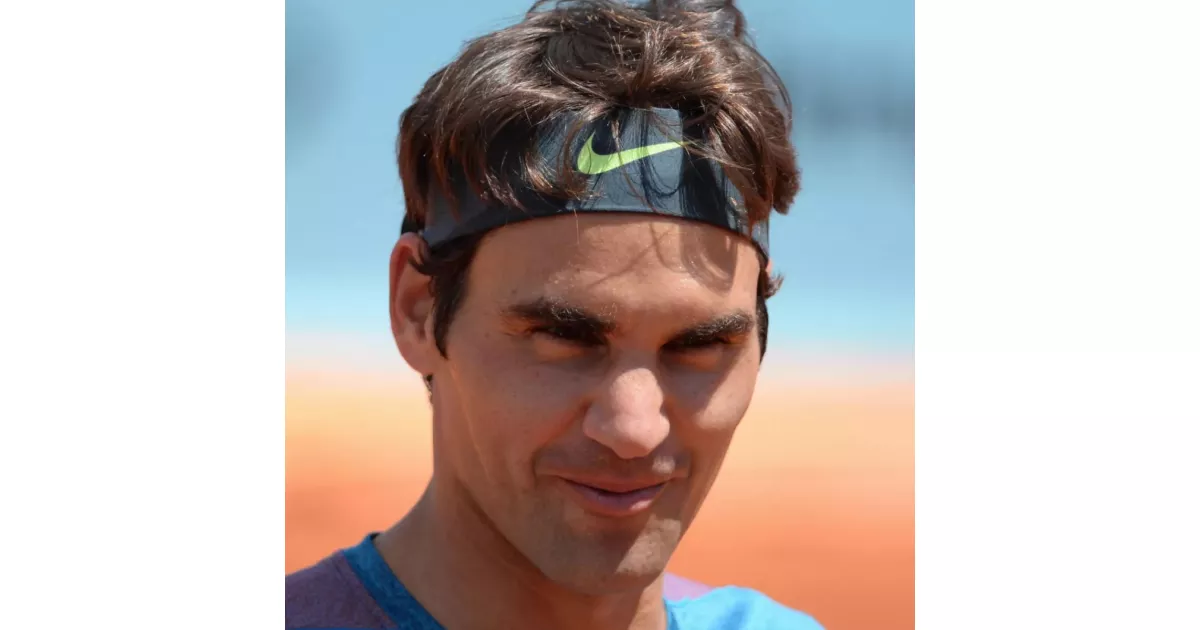Roger Federer is a retired Swiss professional tennis player widely regarded as one of the greatest of all time. He held the world No. 1 ranking for a record 310 weeks, including 237 consecutive weeks, and finished the year as No. 1 five times. He won 103 ATP singles titles, the second-most in the Open Era, along with 20 Grand Slam men's singles titles and six ATP Finals titles, solidifying his legacy in the sport.
1968: Start of the Open Era
Since the start of the Open Era in 1968, Federer has won 103 singles titles on the ATP tour, the second most.
1969: Rod Laver's Grand Slam year
In 1969, Rod Laver had a Grand Slam year, achieving a historic feat in tennis.
1969: Rod Laver's Reach All Four Finals
In 1969, Rod Laver was the last man to reach all four finals in a calendar year before Roger Federer matched the achievement in 2006.
1974: Oldest Man to Reach a Major Final Since 1974 US Open
At 37 years, 11 months and 6 days, Roger Federer became the oldest man to reach a major final since Ken Rosewall in the 1974 US Open at Wimbledon in 2019.
1974: Oldest Player in a Grand Slam Final Since Ken Rosewall
At the 2017 Australian Open, Roger Federer became the oldest player to compete in a Grand Slam final since Ken Rosewall in 1974.
1974: Jimmy Connors's winning percentage
In 1974, Jimmy Connors set a high winning percentage.
1976: Second Man in Open Era to Win Wimbledon Without Dropping a Set
In 2017, Roger Federer became the second man in the Open era to win Wimbledon without dropping a set after Björn Borg in 1976.
1980: Björn Borg won a major without dropping a set
In 1980, Björn Borg was the first man to win a major without dropping a set before Roger Federer matched the achievement in 2007.
1980: Greatest Wimbledon final since 1980
In 2007, analysts hailed the Wimbledon final between Federer and Nadal as the greatest Wimbledon final since 1980.
August 1981: Roger Federer's Birth
In August 1981, Roger Federer was born in Basel, Switzerland.
1982: Ivan Lendl's most wins
In 1982, Ivan Lendl achieved the most wins, a mark that was later surpassed by Roger Federer in 2006.
1984: John McEnroe's most singles titles
In 1984, John McEnroe achieved the most singles titles, a mark that was later surpassed by Roger Federer in 2006.
1984: John McEnroe's winning percentage
In 1984, John McEnroe set a high winning percentage.
1986: Ivan Lendl's record of 74-6
In 1986, Ivan Lendl achieved a record of 74-6, which was the best until Roger Federer surpassed it, marking a significant milestone in Lendl's career.
1988: Mats Wilander's last season winning three Grand Slam singles titles
In 1988, Mats Wilander was the last person to win three Grand Slam singles titles in a single season before Roger Federer matched the achievement in 2004.
1991: Oldest Man in a Grand Slam Semifinal Since Jimmy Connors
At the 2017 Australian Open, Roger Federer became the oldest man to compete in a grand slam semifinal since Jimmy Connors in 1991.
1992: Ball Boy at Swiss Indoors
In 1992, Federer worked as a ball boy at his hometown Basel event, the Swiss Indoors.
1992: Davis Cup Final Appearance
In 1992, before Roger Federer's involvement, the Swiss team reached the Davis Cup final, a feat they would not achieve again until Federer's commitment in 2014.
1993: Swiss National Junior Championships
In 1993, Federer won the under-12 Swiss national junior championships in Lucerne and also received a medal at the Swiss Indoors in Basel as a ball boy.
1993: Pete Sampras's 81 match victories
In 1993, Pete Sampras achieved 81 match victories, the most until Roger Federer surpassed it in 2005.
1995: Swiss National Tennis Center
In 1995, Roger Federer trained at the Swiss National Tennis Center.
1995: Thomas Muster's most singles titles
In 1995, Thomas Muster achieved the most singles titles, a mark that was later surpassed by Roger Federer in 2006.
1995: Swiss National Junior Championship
In 1995, at age 13, Federer won the U14 Swiss national junior championship.
July 1996: First ITF Junior Match
In July 1996, at age 14, Roger Federer played his first ITF junior match at a grade-2 tournament in Switzerland.
January 1997: U18 Swiss National Championship
In January 1997, at age 15, Federer won both the indoor and outdoor U18 Swiss national championship, defeating Yves Allegro in both finals.
July 1997: Completion of Compulsory Education
In July 1997, Roger Federer completed his compulsory education at La Planta secondary school in Chavannes-près-Renens.
July 1998: ATP Debut at Swiss Open Gstaad
In July 1998, Federer made his ATP debut at the Swiss Open Gstaad, losing to Lucas Arnold Ker in the first round.
December 1998: End of Junior Career
By the end of December 1998, Roger Federer had attained the No. 1 junior world ranking and was named ITF Junior World Champion, ending his junior career.
1998: Grand Slam Results
In 1998, Roger Federer achieved the following results in Grand Slam tournaments: SF in the Australian Open, 1R in the French Open, W in Wimbledon, and 1R in the US Open.
1998: Wimbledon Junior Championship
In 1998, Roger Federer became the Wimbledon junior champion.
September 1999: Entry into Top 100
On 20 September 1999, Roger Federer entered the world’s Top 100 for the first time.
1999: Discharge from military
In 1999, the then-18-year-old Roger Federer was discharged from compulsory military service due to a chronic back problem.
1999: Drafted into Swiss Armed Forces
In 1999, upon turning 18, Roger Federer was drafted into compulsory military service in the Swiss Armed Forces. However, he was soon discharged due to a chronic back problem.
1999: Lowest-Ranked Player Defeat
In 2017, at Stuttgart, Tommy Haas (ranked No. 302) beat Roger Federer despite holding match points, the lowest-ranked player to beat him since No. 407 Bjoern Phau in 1999.
February 2000: First Singles Final
In February 2000, Federer reached his first singles final at the Marseille Open, where he lost to Marc Rosset.
2000: Runner-up at Swiss Indoors
In 2000, Roger Federer finished runner-up at the Swiss Indoors tournament in Basel, Switzerland.
2000: Met Miroslava Federer at Sydney Olympics
Roger Federer met his future wife, Miroslava Federer (née Vavrinec), while they were both competing for Switzerland at the 2000 Sydney Olympics.
2000: Grand Slam Streak Begins
Roger Federer's withdrawal from the 2016 French Open broke his record of 65 consecutive participations in Grand Slam main draws, a streak that began at the 2000 Australian Open.
2000: First Season Without a Title Since 2000
Roger Federer's withdrawal from the 2016 season meant it would be his first season since 2000 in which he failed to win a title.
January 2001: Hopman Cup Victory
In January 2001, Federer won the Hopman Cup representing Switzerland, along with Martina Hingis, defeating the American pair of Monica Seles and Jan-Michael Gambill in the finals.
2001: First Singles Title and Wimbledon Breakthrough
In 2001, Federer won his first singles title at the Milan Indoor tournament and defeated Pete Sampras at Wimbledon to snap Sampras' 31-match win streak.
2001: Lleyton Hewitt's US Open Title
In 2001, Lleyton Hewitt won the US Open. In a later US Open, Roger Federer defeated Lleyton Hewitt for his first title there.
2001: Runner-up at Swiss Indoors
In 2001, Roger Federer finished runner-up at the Swiss Indoors tournament in Basel, Switzerland.
2001: Hopman Cup Title with Martina Hingis
In 2018, Roger Federer started his season by winning his second Hopman Cup title, this time partnering with Belinda Bencic, after having won previously in 2001 with Martina Hingis.
August 2002: Death of Peter Carter
On 1 August 2002, Federer suffered the devastating loss of his long-time Australian coach and mentor, Peter Carter, in a car crash in South Africa.
October 2002: Federer Ranked Among Top Eight
From October 14, 2002, Roger Federer was ranked among the top eight players in the world.
2002: Mirka's retirement
In 2002, Miroslava Federer retired from the tour because of a foot injury.
2002: First Masters Title and Loss of Coach
In 2002, Roger Federer won his first Masters title in Hamburg and suffered the loss of his coach Peter Carter.
2002: First time since 2002 without a Grand Slam title
In 2011, following his loss at the US Open, it marked the first time since 2002 that Roger Federer had not won any of the four Grand Slam titles, ending a long streak of success.
July 2003: Time before Federer dropped out of the top 4
In July 2003, it was the last time Federer dropped out of the top 4 before 2013.
August 2003: Chance to Take No. 1 Ranking
In August 2003, Roger Federer had a chance to take over the No. 1 ranking for the first time from Andre Agassi if he made it to the Montreal final, but he lost in the semifinals.
2003: First Grand Slam Singles Title at Wimbledon
In 2003, Federer won his first Grand Slam singles title at Wimbledon, defeating Mark Philippoussis in the final.
2003: Roddick's US Open Title
In 2003, Roddick was the champion of US Open. In 2006, Roger Federer defeated Roddick in the US Open final.
2003: ATP Fans' Favorite Award
In 2003, Roger Federer received the ATP Fans' Favorite award.
2003: Exempted from Military Service
In 2003, Roger Federer was ruled "unsuitable" and was subsequently exempted from his military service obligation. Instead, he served in the civil protection force and was required to pay 3% of his taxable income.
February 2004: Federer Ranked No. 1
In February 2004, Roger Federer was ranked No. 1 for a record 237 consecutive weeks.
May 2004: Supporting IMBEWU
From May 2004, Roger Federer began supporting the South Africa-Swiss charity IMBEWU, which helps children better connect to sports as well as social and health awareness.
2004: One of the three years where Federer won three majors
2004 was one of the three years, along with 2006 and 2007, where Roger Federer won three majors.
2004: First time since 2004 Failed to reach Grand Slam semifinal
At the French Open, Federer failed to reach a Grand Slam semifinal for the first time since the 2004 French Open, ending a long streak of success.
2004: Dominance in Men's Tennis
In 2004, Federer won three of the four majors and the Tour Finals, marking a period of dominance in men's tennis.
2004: Start of Federer-Nadal Rivalry
In 2004, Roger Federer and Rafael Nadal began their rivalry, playing 40 times with Nadal winning 24 matches and Federer winning 16.
2004: Missed Swiss Indoors
In 2004, Roger Federer missed the Swiss Indoors tournament due to injuries.
2004: Tied record of 11 singles titles
In 2004, Roger Federer won 11 singles titles, a mark that he tied in 2005.
2004: Federer Wins Australian Open and Roddick Loses No. 1 Ranking
In 2004, Roger Federer won his first Australian Open, causing Andy Roddick to lose his No. 1 ranking.
2004: ATP Player of the Year and ITF World Champion
In 2004, Roger Federer won the ATP Player of the Year and was named the ITF World Champion.
2004: Won three Grand Slam singles titles and became world No. 1
In 2004, Roger Federer won three Grand Slam singles titles, marking the first time someone had achieved this feat in a single season since 1988. He secured his first major hard-court title at the Australian Open, defeating Marat Safin, which propelled him to the world No. 1 ranking for the first time. He also won at Indian Wells and Hamburg Masters.
2004: Australian Open Prize Money
In 2004, when Roger Federer first won the Australian Open, he earned $985,000.
2004: Rally for Relief
In 2005, at the Pacific Life Open, Roger Federer arranged an exhibition with several top players from the ATP and WTA tour called Rally for Relief, whose proceeds went to the victims of the tsunami caused by the 2004 Indian Ocean earthquake.
July 2005: Federer and Nadal Top ATP Rankings
From July 2005, Roger Federer and Rafael Nadal held the top two rankings on the ATP Tour.
2005: Rod Laver's praise of Federer
In 2005, Rod Laver described Roger Federer as an "unbelievable talent" and "capable of anything", predicting he could be the greatest tennis player of all time.
2005: Auctioned Racquet for Hurricane Katrina Relief
In 2005, Roger Federer auctioned his racquet from his US Open championship to aid victims of Hurricane Katrina.
2005: Missed Swiss Indoors
In 2005, Roger Federer missed the Swiss Indoors tournament due to injuries.
2005: Visit to South Africa
In 2005, Roger Federer visited South Africa to meet children who had benefited from his support of the IMBEWU charity.
2005: Won Wimbledon and US Open
In 2005, Roger Federer won Wimbledon for the third time by defeating Andy Roddick and secured the US Open title against Andre Agassi in Agassi's last major final.
2005: Laureus World Sportsman of the Year Award
In 2005, Roger Federer won the Laureus World Sportsman of the Year award.
2005: First time winning Rotterdam Open
In 2012, Roger Federer won the Rotterdam Open for the first time since 2005.
2005: Start of Period of Sustained Excellence
Since 2005 Wimbledon, Federer had made 18 out of 19 finals in Grand Slam tournaments, a period of sustained excellence unparalleled in the Open Era.
April 2006: Appointed UNICEF Goodwill Ambassador
In April 2006, Roger Federer was appointed a Goodwill Ambassador by UNICEF and has appeared in public service announcements to raise awareness of AIDS.
August 2006: Last defeat before first-round loss in Indian Wells
Prior to his first-round loss in Indian Wells in 2007, Roger Federer's last defeat was in August 2006, marking a period of over seven months without a loss.
December 2006: Visit to Tamil Nadu
In December 2006, Roger Federer visited Tamil Nadu, India, one of the areas most affected by the 2004 Indian Ocean tsunami.
2006: One of the three years where Federer won three majors
2006 was one of the three years, along with 2004 and 2007, where Roger Federer won three majors.
2006: Federer-Nadal Rivalry in Finals
From 2006, Roger Federer and Rafael Nadal played each other in every French Open final and every Wimbledon final.
2006: Statistically best season of career
In 2006, Roger Federer had what was statistically considered the best season of his career, marked by numerous titles and high performance in tournaments.
2006: Met Pope Benedict XVI
In 2006, Roger Federer met Pope Benedict XVI while playing the Italian Open tournament in Rome.
2006: Won ATP 500 series event in Tokyo and the year-end championships
In 2006, Roger Federer won an ATP 500 series event in Tokyo and captured the year-end championships for the third time, finishing the year as world No. 1.
2006: Arthur Ashe Humanitarian of the Year Award
In 2006, Roger Federer won the Arthur Ashe Humanitarian of the Year Award.
2006: Won three Grand Slam singles titles and reached the final of the other
In 2006, Roger Federer won three Grand Slam singles titles and reached the final of the French Open, marking a dominant season in his career.
2006: Multiple Titles
In 2006, Roger Federer won three of the four majors and the Tour Finals.
2006: Career-Best Start to a Season
In March 2018, Roger Federer reached a career-best start to a season at 17–0, beating his previous best start at 16–0 in 2006, until being defeated by Juan Martín del Potro in the Indian Wells Masters final.
2006: Highest Win Percentage Since 2006
Roger Federer's 2017 season marked the highest win percentage since 2006.
December 2007: Possible onset of Mononucleosis
In March 2008, Roger Federer revealed that he had recently been diagnosed with mononucleosis and that he may have suffered from it as early as December 2007.
2007: Federer-Nadal Wimbledon Final
In 2007, Federer and Nadal faced each other in the Wimbledon final, resulting in a five-set match.
2007: Multiple Titles
In 2007, Roger Federer continued his dominance by winning three of the four majors and the Tour Finals.
2007: Federer Defeats Djokovic at US Open
In 2007, Roger Federer defeated Novak Djokovic in straight sets at the US Open final.
2007: Finished the season as the year-end No. 1 and One of the three years where Federer won three majors
In 2007, Roger Federer finished the season as the year-end No. 1 and it was also one of the three years, along with 2004 and 2006, where he won three majors.
2007: Won Australian Open and Dubai crown
In 2007, Roger Federer won the Australian Open without dropping a set and captured his fourth Dubai crown, extending his winning streak to 41 matches.
2007: Most Titles Since 2007
Roger Federer's 2017 season marked the most titles since 2007.
March 2008: Diagnosis of Mononucleosis
In March 2008, Roger Federer revealed that he had recently been diagnosed with mononucleosis.
August 2008: Nadal Surpasses Federer in ATP Rankings
In August 2008, Rafael Nadal surpassed Roger Federer in the ATP rankings.
2008: First Wimbledon Match Against Nadal Since 2008 Final
At Wimbledon in 2019, Roger Federer defeated Nadal in their 40th and final professional meeting to reach his record 12th final at the tournament. This was also the first time Federer played Nadal at Wimbledon since the 2008 Wimbledon final.
2008: Murray Wins Against Federer at ATP 1000 Shanghai
In 2008, Andy Murray defeated Roger Federer at the ATP Finals in Shanghai.
2008: Federer-Nadal Wimbledon Final
In 2008, Federer and Nadal's Wimbledon final was lauded as the greatest match ever by many long-time tennis analysts.
2008: Loss Against Nadal in French Open Final
In 2008, Federer lost a set 6-0 against Nadal in the French Open final.
2008: Olympic Doubles Gold
In 2008, Roger Federer and Stan Wawrinka secured an Olympic doubles gold victory at the Beijing Olympics.
2008: Won gold medal in doubles at the Olympic Games and US Open
In 2008, Roger Federer and Stan Wawrinka won the gold medal in doubles at the Olympic Games. Federer also captured his only Grand Slam of the year at the US Open, defeating Andy Murray in the final.
2008: Partnership with Mercedes-Benz
In 2008, Roger Federer partnered with German car giant Mercedes-Benz.
2008: Federer Wins Olympic Gold Medal in Doubles
In 2008, Roger Federer won a men's doubles gold medal at the Olympics.
2008: Federer Wins US Open Final Against Murray
In 2008, Roger Federer won the US Open final against Andy Murray in straight sets.
2008: Hampered by mononucleosis and lost in Grand Slam finals
In 2008, Roger Federer's performance was hampered by mononucleosis. He lost in the semifinals of the Australian Open and in two Grand Slam finals to Nadal. However, he captured three titles playing in 250-level events.
2008: Defending a Major Title
In 2018, Roger Federer defended his title at the Australian Open, the first time since the 2008 US Open that he successfully defended a major title.
April 2009: Marriage to Miroslava Federer
On April 11, 2009, Roger Federer married former Women's Tennis Association player Miroslava Federer (née Vavrinec) at Wenkenhof Villa in Riehen near Basel.
August 2009: Nadal Falls to No. 3 in ATP Rankings
In August 2009, Rafael Nadal fell to No. 3 in the ATP rankings, ending the Federer-Nadal reign at the top.
2009: US Open Final Appearance
At the US Open in 2015, Roger Federer advanced to his first final since 2009, ultimately losing to Novak Djokovic.
2009: Greatest Player of All Time Recognition
Between 2009 and 2018, Roger Federer was considered by many players and analysts to be the greatest player ever.
2009: Career Grand Slam at French Open
In 2009, Federer completed the career Grand Slam at the French Open.
2009: Federer-Nadal Australian Open Final
In 2009, Roger Federer and Rafael Nadal met in the Australian Open final.
2009: Lost in the final of the Australian Open and struggled
In 2009, Roger Federer began the season with a loss to Nadal in the final of the Australian Open, followed by a period of struggle before the clay season.
2009: Federer Wins Against Murray at ATP Finals London
In 2009, Roger Federer won against Andy Murray at the ATP Finals in London.
2009: Fifth ATP Player of the Year and ITF World Champion
In 2009, Roger Federer won his fifth ATP Player of the Year award and was named the ITF World Champion for the fifth time.
2009: Istanbul Open Title
In May 2015, Roger Federer won the inaugural Istanbul Open, ending a title drought on red clay since the 2009 French Open.
2009: Lindt Brand Ambassador
Roger Federer has been the brand ambassador for Lindt since 2009.
2010: Murray Leads Rivalry with Federer
By 2010, Andy Murray led the rivalry with Roger Federer, with a record of 8-5.
2010: Finished in the top two for the eighth consecutive season
In 2010, Roger Federer finished in the top two for the eighth consecutive season, showcasing his consistent performance and dominance in the sport.
2010: Federer Wins Against Murray at ATP Finals London
In 2010, Roger Federer won against Andy Murray at the ATP Finals in London.
2010: Global partnership deal with Mercedes-Benz
In 2010, Roger Federer's endorsement with Mercedes-Benz was extended into a global partnership deal.
2010: 'Hit for Haiti' Charity Event
In 2010, in response to the Haiti earthquake, Roger Federer arranged a collaboration with fellow top tennis players for a special charity event during the 2010 Australian Open called 'Hit for Haiti', whose proceeds went to Haiti earthquake victims. He also participated in a follow-up charity exhibition during the 2010 Indian Wells Masters, which raised $1 million.
2010: Match for Africa in Zurich and Madrid
In 2010, the Nadal vs. Federer "Match for Africa" in Zürich and Madrid raised more than $4 million for the Roger Federer Foundation and Fundación Rafa Nadal.
January 2011: Rally for Relief
In January 2011, Roger Federer took part in Rally for Relief, an exhibition to raise money for the victims of the Queensland floods.
November 2011: Federer's 2006 season ranked second-best
In November 2011, Stephen Tignor of Tennis.com ranked Roger Federer's 2006 season as statistically the second-best season of all time during the Open Era.
2011: Federer Dominates Second Half of Rivalry with Murray
From 2011 onwards, Roger Federer dominated the second half of the rivalry with Andy Murray, leading 9-3.
2011: Federer-Nadal French Open Final
In 2011, Roger Federer and Rafael Nadal met in the French Open final.
2011: Federer Ends Djokovic's Undefeated Start
In 2011, Roger Federer ended Novak Djokovic's perfect 41-0 start to the season in the semifinals of the French Open.
2011: Lost to Novak Djokovic after winning the first two sets
In 2011, Roger Federer lost in the semifinals of the US Open to Novak Djokovic in five sets after winning the first two sets, marking the second time that year he lost after winning the first two sets.
2011: Tour Sportsmanship Award
In 2011, Roger Federer received the tour Sportsmanship Award.
2011: Defeated Djokovic at French Open but Lost to Nadal
The year 2011 was a lean year for Federer. He ended Djokovic's undefeated streak of 43 consecutive wins at the French Open semifinals, but then lost in the final to Rafael Nadal.
2012: Australian Open Victory
At the 2017 Australian Open, Roger Federer defeated Rafael Nadal to win his first major since 2012. With this victory, he re-entered the top ten.
2012: Silver Medal at London Olympics
In 2012, Federer won a silver medal in singles at the London Olympics, finishing as runner-up to Andy Murray.
2012: Federer Beats Djokovic at Wimbledon
In 2012, Roger Federer beat Novak Djokovic in the semifinals of Wimbledon.
2012: Federer's Perspective on Comparing Players
In 2012, Roger Federer stated that it is impossible to compare tennis players from different eras.
2012: Federer Wins Olympic Silver Medal in Singles
In 2012, Roger Federer won a men's singles silver medal at the Olympics.
2012: Won seventh Wimbledon championship and a silver medal at the Summer Olympics
In 2012, Roger Federer won his seventh Wimbledon championship, tying Sampras' Open Era record, and also won a silver medal at the Summer Olympics after losing in the final to Murray.
2012: Won Rotterdam Open, Dubai Championships, and Indian Wells Masters
In 2012, Roger Federer won the Rotterdam Open, Dubai Championships, and Indian Wells Masters, marking a successful start to the season.
2012: Federer Wins Wimbledon Championships Against Murray
In 2012, Roger Federer won the Wimbledon Championships against Andy Murray in four sets.
2012: First Seeded at a Grand Slam Since 2012 US Open
In June 2018, Roger Federer regained the No. 1 ranking at the Stuttgart Open. At Wimbledon, Federer was seeded first at a Grand Slam for the first time since the 2012 US Open.
2012: Murray Defeats Federer at Summer Olympics
In the final of the 2012 Summer Olympics, Andy Murray defeated Roger Federer in straight sets, denying Federer a career Golden Slam.
2012: Return to Grand Slam Wins
Roger Federer's 2017 season marked a return to Grand Slam wins since 2012.
May 2013: Return to No. 2 Ranking
Following his victory at the Shanghai Masters in 2014, Roger Federer returned to the No. 2 ranking for the first time since May 2013.
December 2013: Announced Stefan Edberg as co-coach
On 27 December 2013, Roger Federer announced that Stefan Edberg was joining his team as co-coach with Severin Lüthi, marking a new direction in his coaching staff.
2013: Arthur Ashe Humanitarian of the Year Award
In 2013, Roger Federer won the Arthur Ashe Humanitarian of the Year Award.
2013: Won Gerry Weber Open and suffered worst Grand Slam defeat since 2003
In 2013, Roger Federer won the Gerry Weber Open but suffered his worst Grand Slam tournament defeat since 2003 at Wimbledon.
2014: Frank Sedgman Ranks Federer Second Greatest
In 2014, Frank Sedgman ranked Roger Federer number two behind Jack Kramer in his greatest male tennis players of all-time list in his autobiography 'Game, Sedge and Match'.
2014: Davis Cup Victory
In 2014, Roger Federer and Stan Wawrinka led the Switzerland Davis Cup team to their first title.
2014: Birth of twin boys
In 2014, Roger Federer and his wife had another pair of twins, this time fraternal twin boys.
2014: Federer Ends Djokovic's Winning Streak in China
In 2014, Roger Federer ended Novak Djokovic's 28 straight wins in China at the Shanghai Open.
2014: Federer Wins Against Murray at ATP Finals London
In 2014, Roger Federer won against Andy Murray at the ATP Finals in London.
2014: Shanghai Masters and Swiss Indoors Titles
In 2014, Roger Federer won the Shanghai Masters, defeating Novak Djokovic in the semifinals. He also secured his sixth Swiss Indoors title. He reached the ATP Finals but withdrew due to injury.
2014: Davis Cup Commitment and Success
In 2014, Stanislas Wawrinka's Grand Slam singles victory renewed hope for Roger Federer's Davis Cup aspirations. Federer and Wawrinka committed to playing every Davis Cup tie. Their dedication resulted in victories over Serbia, Kazakhstan, and Italy, enabling the Swiss team to reach the final for the first time since 1992.
2014: Match for Africa 2 in Zurich
In 2014, the "Match for Africa 2" between Roger Federer and Stan Wawrinka, again in Zürich, raised £850,000 for education projects in Southern Africa.
2014: Stefan Edberg Joins Coaching Team
In December 2015, Roger Federer announced that Stefan Edberg, who originally signed on for one season only in 2014, would be replaced by Ivan Ljubičić, with Severin Lüthi remaining as head coach.
2014: Joined hands with Sunrise
Roger Federer joined hands with Sunrise, Switzerland's largest telecommunications company, in 2014.
2015: First Win Over Djokovic Since 2015
At the ATP Finals in 2019, Roger Federer defeated Novak Djokovic in straight sets, marking his first win over Djokovic since 2015.
2015: Djokovic Prevails over Federer at US Open
In 2015, Novak Djokovic prevailed over Roger Federer in four sets at the US Open final.
2015: Brisbane International Title and 1,000 Wins
In 2015, Roger Federer won the Brisbane International, securing his 1,000th career win. He became the third man in the Open Era to achieve this milestone and the first to win a title in 15 consecutive years.
2015: Coaching Team Changes
In December 2015, Roger Federer announced that Ivan Ljubičić would replace Stefan Edberg in his coaching team, while Severin Lüthi remained head coach.
October 2016: Federer Falls Out of Top Eight
On October 31, 2016, Roger Federer fell out of the top eight players in the world due to injuries.
2016: Hiatus for Knee Surgery
In 2016, Roger Federer took a half-year hiatus to recover from knee surgery.
2016: Return to Clay Court Season
In 2019, after his Australian Open performance, Roger Federer announced he would play the clay court season for the first time since 2016.
2016: Withdrawal from Olympics and Season
On July 26, 2016, Roger Federer announced his withdrawal from the Summer Olympics and the remainder of the season to recover from a knee injury. This marked his first season since 2000 without a title and a drop out of the top ten rankings for the first time in fourteen years.
2016: Lowest Ranking in Over Fifteen Years
Roger Federer's withdrawal from most of the 2016 season led his ranking to slip to No. 17 at the start of the 2017 season, his lowest in over fifteen years.
September 2017: Federer and Nadal Reclaim Top ATP Rankings
From September 2017, Roger Federer and Rafael Nadal again held the top two rankings on the ATP Tour.
2017: Laureus World Comeback of the Year Award
Following his 2017 comeback season, Roger Federer won the Laureus World Comeback of the Year award.
2017: Australian Open and Wimbledon Championships
In 2017, Federer won the Australian Open over Nadal and a record eighth singles title at the Wimbledon Championships.
2017: Federer-Nadal Australian Open Final
In 2017, Roger Federer and Rafael Nadal met in the Australian Open final.
2017: Shanghai Masters and Swiss Indoors Titles
In 2017, Roger Federer captured his third Masters title of the season at the Shanghai Masters, defeating Rafael Nadal in the final. He also surpassed Ivan Lendl in number of career titles by winning the Swiss Indoors.
2017: Return to Grand Slam Wins
Roger Federer's 2017 season marked a return to Grand Slam wins since 2012, the most titles since 2007, and the highest win percentage since 2006, making it his best season since 2007.
October 2018: Djokovic Becomes No. 2 in ATP Rankings
In October 2018, Novak Djokovic became the new No. 2 in the ATP rankings.
2018: Greatest Player of All Time Recognition
Between 2009 and 2018, Roger Federer was considered by many players and analysts to be the greatest player ever.
2018: Laureus World Sportsman of the Year Award
In 2018, Roger Federer won the Laureus World Sportsman of the Year award.
2018: Tennis.com Lists Federer as Greatest
In 2018, Tennis.com listed Roger Federer as the greatest male player of the Open Era.
2018: 20 Major Singles Titles and Oldest ATP World No. 1
In 2018, at the Australian Open, Federer became the first man to win 20 major singles titles and the oldest ATP world No. 1 at the time, at age 36.
2018: Increased Australian Open Prize Money
In 2018, when Roger Federer won the Australian Open, the prize had increased to AUD 4 million.
2018: Match for Africa in San Jose
In the 2018 "Match for Africa" in San Jose, California, Roger Federer paired up with Microsoft billionaire Bill Gates in a doubles clash against Jack Sock and NBC Today show host Savannah Guthrie. He and Gates won, and notably, Federer even won one point on his knees after returning two shots while on the ground.
2019: Guinness World Records
As of 2019, Roger Federer held the third highest number of Guinness World Records within one discipline, a total of 30, which include 18 performance based records.
2019: Djokovic Surpasses Australian Open Record
In 2018, Roger Federer won his sixth title at the Australian Open, equaling the then record held by Roy Emerson and Novak Djokovic, which was surpassed by Djokovic in 2019.
2019: Federer Wins Against Nadal at Wimbledon
In 2019, Federer won against Nadal at the Wimbledon Championships to reach the final.
2019: Djokovic Defeats Federer at Wimbledon
In 2019, Novak Djokovic defeated Roger Federer at Wimbledon, saving two match points.
May 2020: Tennis Channel Ranks Federer as Greatest
In May 2020, the Tennis Channel ranked Roger Federer as the greatest male tennis player of all time.
July 2020: Featured by Swiss National Museum
In July 2020, Roger Federer was featured in the Swiss National Museum's chronicle of Swiss history and culture.
2020: Highest-Paid Athlete
In 2020, Roger Federer ranked first among all athletes with $100 million in endorsement income.
2020: Federer's 2020 Season and Knee Surgery
In 2020, Roger Federer reached the Australian Open semifinals but lost to Djokovic after sustaining a groin injury. He then underwent arthroscopic surgery for a right knee injury in February and withdrew from several tournaments to recover. A setback in rehabilitation led to another procedure, sidelining him for the rest of the year.
2020: Second Knee Surgery
In 2020, Roger Federer underwent the second of three procedures on his knees, on his left knee.
January 2021: Withdrawal from Australian Open
In January 2021, Roger Federer withdrew from the Australian Open because he was still recovering from knee surgery and because of the strict COVID-19 quarantine measures in Australia.
May 2021: Serena Williams Calls Federer a Genius
In May 2021, Serena Williams described Roger Federer as a "genius" and the "greatest".
2021: Inactivity after Wimbledon
After Wimbledon 2021, Roger Federer did not participate in any singles tournament.
2021: Federer's Knee Injury and Tournament Withdrawals
In 2021, Federer withdrew from the Australian Open due to ongoing recovery from knee surgery and COVID-19 quarantine measures. He returned to the ATP Tour at the Qatar Open in March, but withdrew from the French Open due to knee problems and lost early in Halle.
2021: Sampras hails Djokovic as the greatest player
In 2021, Pete Sampras hailed Djokovic as the greatest player.
May 2022: Visit to Swiss National Team
In May 2022, Roger Federer made a surprise visit to meet every member of the Swiss national team and to unveil Puma’s new jersey for the team ahead of the 2022 FIFA World Cup.
June 2022: Federer Drops out of Top 50
In June 2022, Roger Federer dropped out of the top 50 in rankings after not playing in a singles tournament since Wimbledon 2021.
July 2022: Federer Becomes Unranked
In July 2022, Roger Federer became unranked for the first time since his professional debut.
September 2022: Federer Announces Retirement at Laver Cup
In September 2022, Roger Federer announced his impending retirement from professional tennis on the ATP Tour, with the Laver Cup to be his final ATP event.
September 2022: Retirement from Professional Tennis
In September 2022, Roger Federer officially retired from professional tennis following the Laver Cup.
2022: Federer's Aims to Return to Tour
In 2022, Roger Federer hoped to return to the tour after undergoing another knee surgery in August 2021.
2022: Third Knee Surgery
In 2022, Roger Federer underwent the third procedure on his knees, this time on his right knee.
June 9, 2024: Receives Doctorate from Dartmouth
On June 9, 2024, Roger Federer received an honorary Doctorate degree in Humane Letters from Dartmouth College, following his commencement address to the Class of 2024.
2024: Djokovic Breaks Oldest ATP World No. 1 Record
In February 2018, Roger Federer became the oldest ATP world No. 1 at 36 years and 195 days of age, a record that stood until Novak Djokovic broke the record in 2024.
Mentioned in this timeline
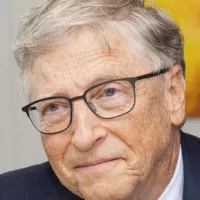
Bill Gates an American businessman and philanthropist revolutionized personal computing...
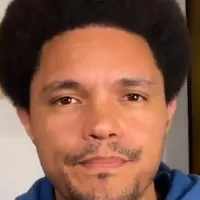
Trevor Noah is a South African comedian writer producer political...

Barack Obama the th U S President - was the...
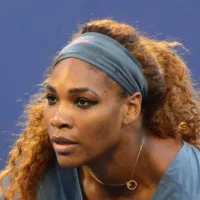
Serena Williams is a retired American professional tennis player widely...

Amazon Prime is a subscription service offering a variety of...
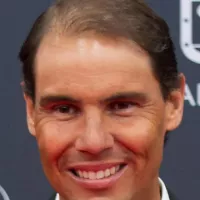
Rafael Nadal a Spanish former professional tennis player achieved the...
Trending
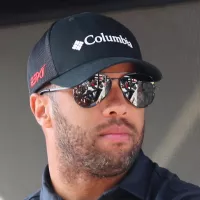
24 minutes ago Larson and SVG collision leads to wreck in NASCAR Atlanta race.

25 minutes ago Chastain and Hill Collide on Final Lap at Atlanta's O'Reilly Race
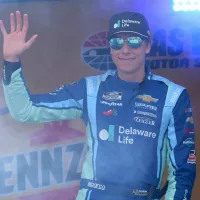
25 minutes ago Hocevar Admits Fault in Logano Incident, Hamlin Involved in Atlanta NASCAR Crash
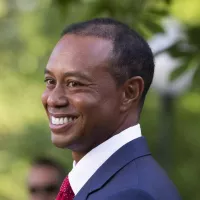
25 minutes ago Tiger Woods eyes Masters return, not ruling out participation, Scheffler favored in 2026.
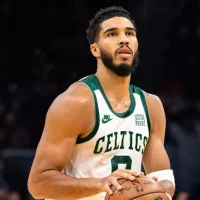
26 minutes ago Jayson Tatum's Injury Status Updates, Return Date Still Unknown Amid Celtics Practice
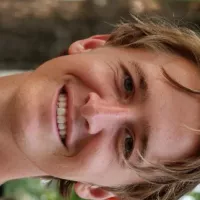
1 hour ago Sebastian Korda Dominates Tommy Paul to Win Delray Beach Open Trophy.
Popular

Jesse Jackson is an American civil rights activist politician and...

Barack Obama the th U S President - was the...

Bernie Sanders is a prominent American politician currently serving as...

Michael Joseph Jackson the King of Pop was a highly...
WWE Raw a professional wrestling television program by WWE airs...
The Winter Olympic Games a major international multi-sport event held...
